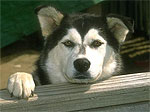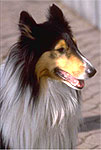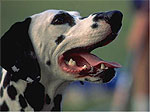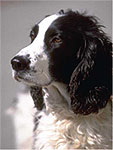 | Sniffing Out Bladder Cancer |
 November 10, 2004
November 10, 2004Dogs may help doctors detect bladder cancer! A new study published in the British Medical Journal shows that dogs can be trained to identify urine samples from people with bladder cancer.
Dr. Carolyn Willis and her colleagues from the Department of Dermatology
at Amersham Hospital (Amersham, UK) trained six dogs over seven months to
The investigators were careful to avoid giving the dogs clues about the samples. For example, the samples were presented to the dogs by a researcher who did not know which dish had the cancer sample.
Each of the six dogs was tested nine times for a total of 54 trials. As a
group, the dogs correctly identified the bladder cancer samples in 22 of
the 54 trials (41%). This is much better than the random chance detection
rate (14.3%).
The scientists are unsure how the dogs detect the bladder cancer samples. They think that bladder cancer may cause specific chemicals to be released into urine. Dogs may be able to use their sensitive sense of smell to identify these chemicals in the samples.
Certainly, further research about how dogs can detect disease needs to be conducted. Although dogs were able to detect bladder cancer samples at a rate better than chance, they still found less than 50% of the diseased samples. Perhaps with further training, dogs will some day work with doctors to help diagnose disease. |
Reference and further information:
|
| GO TO: | Neuroscience In The News | Explore the Nervous System | Table of Contents |
![[email]](./gif/menue.gif) Send E-mail |
 Fill out survey |
 Get Newsletter |
 Search Pages |
 Take Notes |
 discriminate between the urine from people with bladder cancer from that
of people without bladder cancer. The dogs were presented with seven
samples: only one of the seven samples was from a person with bladder
cancer. Therefore, if the dog randomly selected a sample, the chance of
finding the bladder cancer sample was only 1 in 7 (~14.3%).
discriminate between the urine from people with bladder cancer from that
of people without bladder cancer. The dogs were presented with seven
samples: only one of the seven samples was from a person with bladder
cancer. Therefore, if the dog randomly selected a sample, the chance of
finding the bladder cancer sample was only 1 in 7 (~14.3%).
 The researchers also mentioned that all of the dogs alerted to one urine
sample from one person in the control group. This person had normal
laboratory tests and had not been diagnosed with bladder cancer. An
investigator was concerned about this finding and requested further
laboratory tests. After further tests, this person was found to have
cancer of the kidney!
The researchers also mentioned that all of the dogs alerted to one urine
sample from one person in the control group. This person had normal
laboratory tests and had not been diagnosed with bladder cancer. An
investigator was concerned about this finding and requested further
laboratory tests. After further tests, this person was found to have
cancer of the kidney!